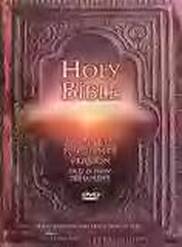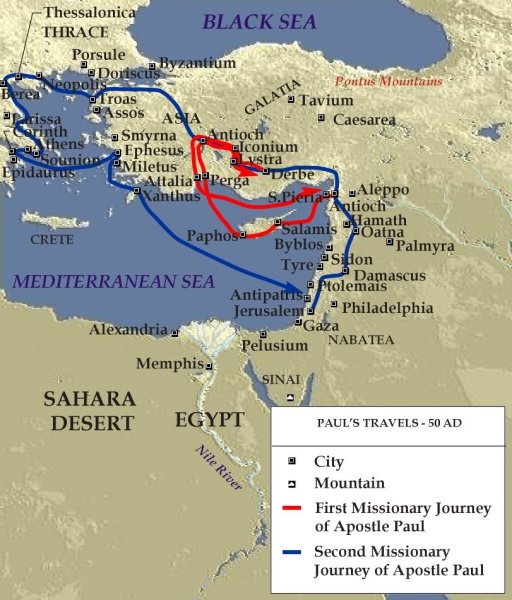Acts 18:12-22
Lesson 263
Read both the "King James Bible" and the "New Living Translation."
In this lesson:
The second missionary journey ends.
Gallio (18:12-18).
Back to Antioch.
Paul's First and Second missionary journeys.
Where was -
Achaia -
One of the two Roman provinces in Greece, the other being Macedonia. Achaia was located in the north-west Peloponnesus (southern half of modern-day Greece) with Corinth as its capital. Second Corinthians was written to the churches in Achaia here.
Cenchrea -
Cenchrea was a Mediterranean seaport located eight miles east of Corinth (in southern Greece). After an eighteen-month evangelical visit to Corinth, Paul walked the eight miles to Cenchrea, then sailed to Syria to end his second missionary journey (Acts 18:18). Cenchrea had an active church (Romans 16:1), perhaps founded by Paul.
Ephesus -
An essential maritime city and vital political, educational, and business center. Ephesus was the capital of the Roman province of Asia (part of modern-day Turkey) located on the Aegean Sea. With a population of 250,000, Ephesus lay on the prosperous trade route from Rome to points east and was governed by a council of one hundred aristocrats. Trade goods from all corners of the Roman Empire passed through Ephesus, making the city wealthy. Wide well kept streets, large public buildings and lavish homes were everywhere. The city was famous for its temple honoring the pagan goddess Artemis (one of the seven wonders of the ancient world), and its great theater. Ephesus was one of the five most important cities in the Roman empire. Romans called Ephesus "the first and greatest metropolis of Asia." Paul established the church in Ephesus (Acts 19:1-41) around AD 53 during his second missionary journey, and it became the center of Christian life after the destruction of Jerusalem in AD 70. Christianity would have taken longer to spread without bustling trade centers like Ephesus. Thanks to Ephesus' central location, the Gospel made its way to all parts of the Roman empire. In Revelations 2:1-7, Jesus dictates a letter to John addressed to the Ephesus church. Paul wrote "The Epistle of Paul the Apostle to the Ephesians" while in prison in Rome (circa AD 60-62). It is believed that the apostle John died in Ephesus. Over the centuries, Ephesus gradually lost its harbor to the accumulation of silt and sediment. Today, the ruins of Ephesus are several miles from the sea. The Austrian Archaeological Institute discovered and excavated the remains of the Artemis temple in the early 20th century.
Achaia -
One of the two Roman provinces in Greece, the other being Macedonia. Achaia was located in the north-west Peloponnesus (southern half of modern-day Greece) with Corinth as its capital. Second Corinthians was written to the churches in Achaia here.
Cenchrea -
Cenchrea was a Mediterranean seaport located eight miles east of Corinth (in southern Greece). After an eighteen-month evangelical visit to Corinth, Paul walked the eight miles to Cenchrea, then sailed to Syria to end his second missionary journey (Acts 18:18). Cenchrea had an active church (Romans 16:1), perhaps founded by Paul.
Ephesus -
An essential maritime city and vital political, educational, and business center. Ephesus was the capital of the Roman province of Asia (part of modern-day Turkey) located on the Aegean Sea. With a population of 250,000, Ephesus lay on the prosperous trade route from Rome to points east and was governed by a council of one hundred aristocrats. Trade goods from all corners of the Roman Empire passed through Ephesus, making the city wealthy. Wide well kept streets, large public buildings and lavish homes were everywhere. The city was famous for its temple honoring the pagan goddess Artemis (one of the seven wonders of the ancient world), and its great theater. Ephesus was one of the five most important cities in the Roman empire. Romans called Ephesus "the first and greatest metropolis of Asia." Paul established the church in Ephesus (Acts 19:1-41) around AD 53 during his second missionary journey, and it became the center of Christian life after the destruction of Jerusalem in AD 70. Christianity would have taken longer to spread without bustling trade centers like Ephesus. Thanks to Ephesus' central location, the Gospel made its way to all parts of the Roman empire. In Revelations 2:1-7, Jesus dictates a letter to John addressed to the Ephesus church. Paul wrote "The Epistle of Paul the Apostle to the Ephesians" while in prison in Rome (circa AD 60-62). It is believed that the apostle John died in Ephesus. Over the centuries, Ephesus gradually lost its harbor to the accumulation of silt and sediment. Today, the ruins of Ephesus are several miles from the sea. The Austrian Archaeological Institute discovered and excavated the remains of the Artemis temple in the early 20th century.
Study Tip:
Read both the Old and New Testaments.
"Nothing less than a whole Bible can make a whole Christian."
Aiden Wilson Tozer (1897-1963).
Read both the Old and New Testaments.
"Nothing less than a whole Bible can make a whole Christian."
Aiden Wilson Tozer (1897-1963).




